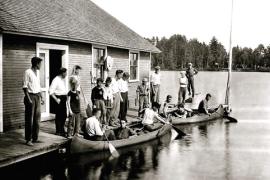By their very nature, camp people are an extremely independent and self-sufficient lot. The most successful among them approach every adversity as a challenge and an opportunity to grow. But at the same time, a dark movie hero once said (among other things), "A man's got to know his limitations."
At the annual Camp Maintenance Conference, camp professionals seem to delight in trying to one-up each other with tales of learning hard lessons by stepping up and announcing, "What have I got to lose?" "What can happen?" and my personal favorite, "How hard can it be?" There's an enormous range in really, really obvious answers to those questions, and it doesn't take much imagination to list them. This month, we're going to examine the seemingly innocent path toward some do-it-yourself catastrophes, and how to hear the little voice that's trying desperately to keep your organization from self-destructive penny-pinching.
Permitting
I've heard it said that the person who represents himself in court has a fool for a client, and dealing with government bodies and agencies is no different. Whether you're remodeling a cabin, or are renewing your wastewater treatment plant's operations permit, there are likely terms and conditions that you may be agreeing to that you simply don't recognize. One case which comes to mind is a camp client who has a wastewater treatment plant. It was built in the early 1970s to a common standard of the day. It operated well within its limits for many years with the permit being renewed as a matter of course every so often.
Not long ago, the renewal paperwork came, was completed in house, and returned to the agency according to the instructions. But because camp personnel weren't completely familiar with all of the terms and conditions of the application, they didn't recognize that new parameters were added to their performance standard, including parameters that their plant had never been designed or operated to meet previously. But because they "accepted" the terms of the renewed permit, they had no recourse but to try to upgrade their systems in an attempt to meet those new terms. They had simply missed the opportunity to make their case to the regulators, and now they're stuck.
So what was the cost of this "DIY"? Time and hundreds of thousands of dollars. The same scenarios abound where camps have taken paperwork "short cuts" for new buildings on the property. The regulatory process can seem very long to the point of being painful, but "midnight construction" is simply installing time bombs that will eventually explode, if not in the laps of people at camp now, in the laps of future leadership. The culture of flying under the proverbial radar often has multiple effects. The chain of logic eventually that becomes a death spiral looks like this: Getting the permits will take time. Applying for the permits will require a designer's seal. Their designing stuff takes time and will cost money that's already hard to come by. And, we need to build [whatever it is] right now. So we don't have the time or the money to do it "that" way. But recognizing that this has been an "industry standard," more insurance companies are asking for documentation that things have been done above board before issuing (or renewing!) building replacement coverage. It's hard to even estimate the cost today of cutting those corners just a few years ago, but I'd bet that it's substantially more than having crossed the "t's" and dotted the "i's" in the first place.
It's true that some permits seem to get out of control. One client recently had to get a herpetologist to certify that there were no bog turtles on his property before he could sell it. No bog turtles?!? The site was so steep that EROSION was the problem, not wetlands and turtles. However, once he had the paperwork in hand, he was able to ask for, and get more for, his properties than he'd been able to before. As a professional engineer, I probably could have made the case that there were no wetlands on the site based on topography alone. However, I know that there are other professionals who are more familiar with the nuances of their realm.
So I engaged another consultant to check things out and prepare the report and correspondence that would satisfy the regulators. In the end, the turtle certification cost less than $1000, and included the extra wording to address any other wetlands concerns that a regulator might have. The client got a multipurpose tool for the price of one!
Consider the "What If's" in Vehicle Repairs
What about vehicle repairs? Sure, routine things like oil changes are do-it-yourself projects. But while I'd change the brakes on our family wagon, I'd think twice about brake work on a camp van. Here is the "what if" that gives me pause for thought: What if I miss a condition which the trained mechanic would recognize? Is this a whole lot different from having licensed medical staff on site to know the difference between a stiff neck from flu and a stiff neck from meningitis? I like to believe that it's camps' understanding of one's "limitations" and not an ACA mandate that has doctors and nurses on staff. So why not let professionals handle critical vehicle service as well? Certainly no less is at stake.
Drawing the Line on Building Repairs
Where's the right place to draw the line on building repairs? That too, can be a tricky question, which requires people to pay attention to the little things. For example, one maintenance department I know was grousing about having to repeatedly replace a screen door on a small cabin. They were sure that the campers were causing the damage through carelessness. But looking a little deeper revealed that the residents changed from year to year and that the other cabins had doors that slammed. Even a little more investigation brought out that this was the same cabin that had the sewer leaks, and as a result, all of the toilets had to be resealed this spring.
Veterans will probably guess correctly what the cause was: The pier foundation was failing (falling over actually), and the building was settling very quickly and very unevenly. The organization came close to compounding the DIY mistake by announcing that they'd just have to jack the building up and rebuild the pier (after the campers left of course!). It was great to work with them as they thought through each of the short-sighted calls that had been made so far, and how things could go really, really wrong in a hurry. Without much more convincing, they found a local building mover who was able to shore the building up, get the proper permits, and get the foundation fixed over a long weekend. For the record, they've not replaced the screen door or the toilet seals since.
While we've seen that "do it yourself" can be a bad thing, take a look at the other side of the coin. Let's call it, "Here, do this because it's too messy and complicated and it's not what I do." One great example is camp planning. Nobody who's ever been through the planning process will tell you that it's easy, because it's not. It is exhausting! For camps that report to boards and committees, the process can be even more painful as leaders try to juggle special interests, budgets, and time. At the same time, the future of your property, and the programs that you can offer are riding on whether and how those programs are accommodated in that plan. Nobody knows your camp better than you do. If your operation's a hundred years old, you have a wealth of knowledge of what's been tried before in your records, alumni, and current staff. At the other end of the spectrum, if your camp exists only in your head, you are the only one who can bring those ideas and dreams to life.
A successful camp plan will require outside help to reconcile the dreams with the opportunities and limitations of the site, as well as the realities of regulation and budget. But understand that this is a highly, highly interactive relationship between the knowledge base of your organization and the knowledge of the consultant. The organization that turns its future over to a consultant will get someone else's plan. The organization that tries to build the plan on its own may find that the dreams are too big or too costly to ever come together. Clearly, the answer here is that you, the client, need to involve yourself in the project as deeply as you can, while allowing the consultant to deliver the knowledge and insight it will take to bring your plan to life.
Camp teaches kids to be self-sufficient. As camp leaders though, we need to also set the example by showing them how and when to ask for help, and then following the counsel we receive. The Darwin Awards (www.darwinawards.com) are chock full of "I'm-smarterthan-you" geniuses. While you can laugh at the absurdity of the unfortunate victims who removed themselves from the gene pool, take a minute to consider whether you may be committing similar organizational mistakes. It would be a shame if government regulations you didn't know about, poor forethought, excessive spending, or project shortcuts buried your very worthy camp.
Rick Stryker, P.E., is a professional engineer, serving camps and conference centers nationwide with consulting services from site planning and design through general consultations on a wide range of infrastructure issues, including water supply, sewage disposal, and construction administration. He can be reached at 570-828-4004, or by e-mail at [email protected].


